Healthcare Learning Theories: Social Cognitive and Self-Determination
VerifiedAdded on 2022/10/11
|12
|2890
|40
Report
AI Summary
This report critically analyzes two healthcare learning theories: Social Cognitive Theory and Self-Determination Theory. It explores how these theories apply to the author's current role as an accredited pharmacist, specifically in patient counseling, medication review, and health education, particularly for individuals with diabetes. The report details the practical application of these theories, including the importance of attention, processing, memory, and action in Social Cognitive Theory, and the roles of competence, connection, and autonomy in Self-Determination Theory. Furthermore, the report discusses the author's future role as a credentialed diabetes educator, outlining the responsibilities and strategies for providing effective diabetes education, including the use of interdisciplinary teams, individualized medication management, and patient self-management skills. The report emphasizes the significance of these theories in promoting behavior change, improving patient outcomes, and reducing the overall economic impact of diabetes.
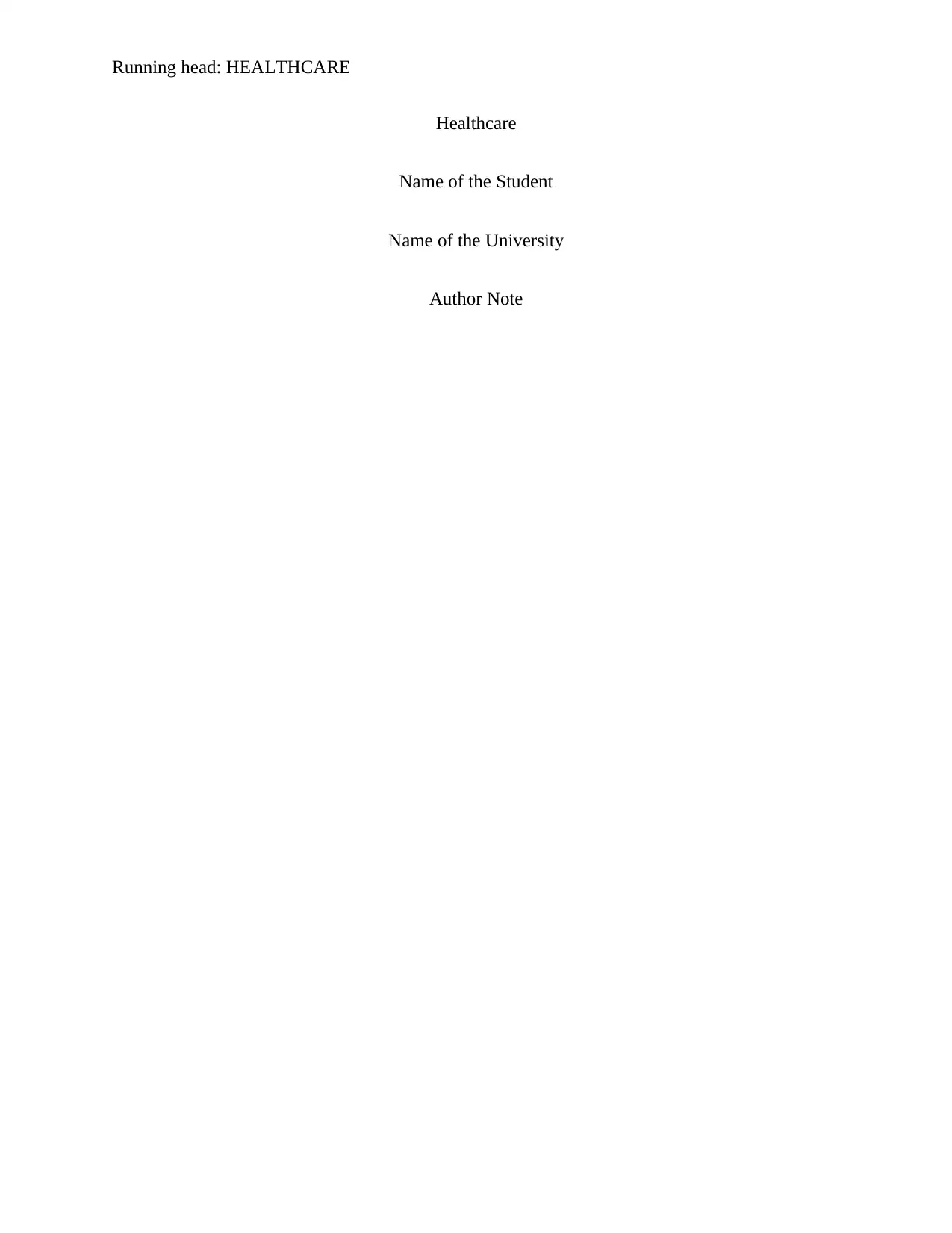
Running head: HEALTHCARE
Healthcare
Name of the Student
Name of the University
Author Note
Healthcare
Name of the Student
Name of the University
Author Note
Paraphrase This Document
Need a fresh take? Get an instant paraphrase of this document with our AI Paraphraser
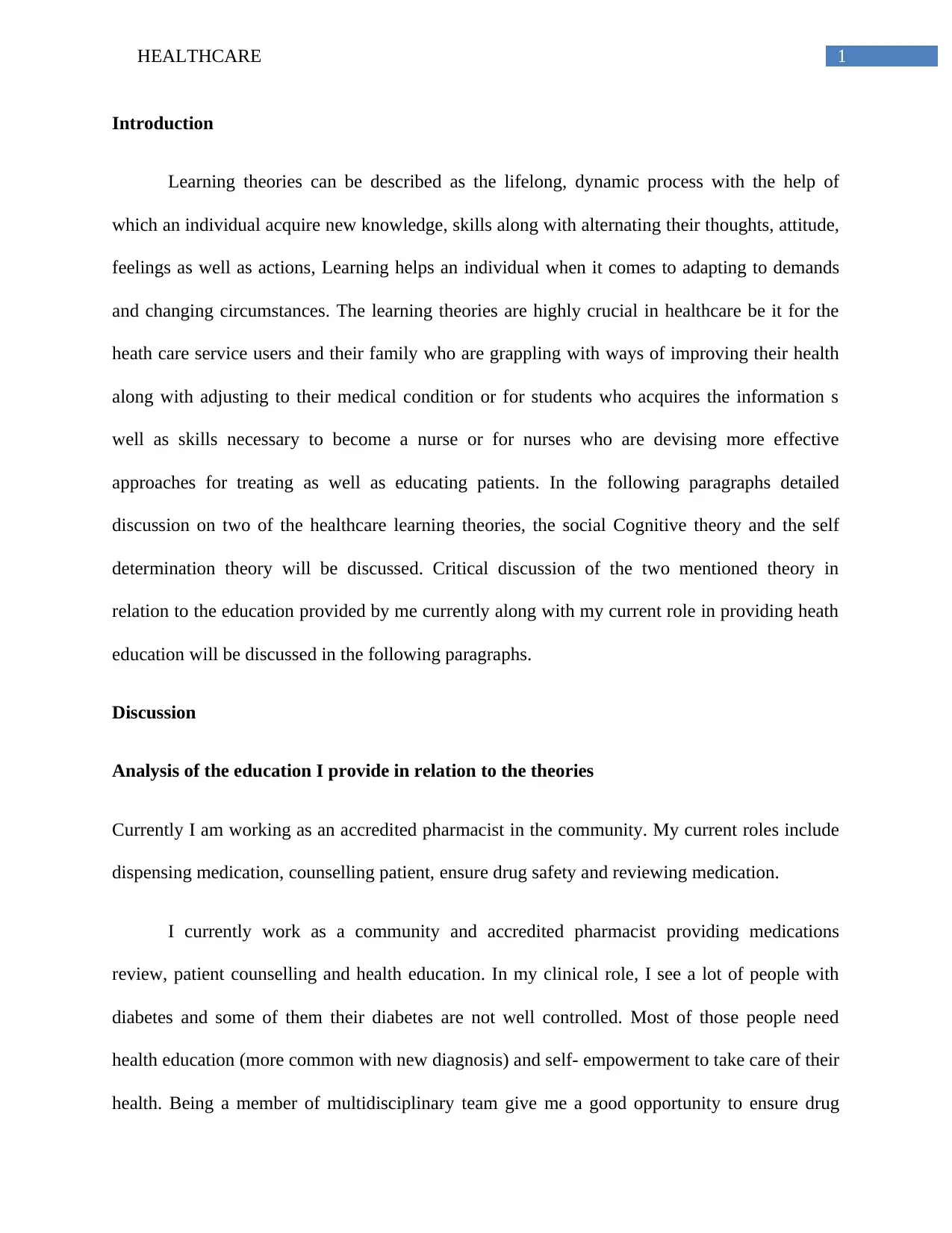
1HEALTHCARE
Introduction
Learning theories can be described as the lifelong, dynamic process with the help of
which an individual acquire new knowledge, skills along with alternating their thoughts, attitude,
feelings as well as actions, Learning helps an individual when it comes to adapting to demands
and changing circumstances. The learning theories are highly crucial in healthcare be it for the
heath care service users and their family who are grappling with ways of improving their health
along with adjusting to their medical condition or for students who acquires the information s
well as skills necessary to become a nurse or for nurses who are devising more effective
approaches for treating as well as educating patients. In the following paragraphs detailed
discussion on two of the healthcare learning theories, the social Cognitive theory and the self
determination theory will be discussed. Critical discussion of the two mentioned theory in
relation to the education provided by me currently along with my current role in providing heath
education will be discussed in the following paragraphs.
Discussion
Analysis of the education I provide in relation to the theories
Currently I am working as an accredited pharmacist in the community. My current roles include
dispensing medication, counselling patient, ensure drug safety and reviewing medication.
I currently work as a community and accredited pharmacist providing medications
review, patient counselling and health education. In my clinical role, I see a lot of people with
diabetes and some of them their diabetes are not well controlled. Most of those people need
health education (more common with new diagnosis) and self- empowerment to take care of their
health. Being a member of multidisciplinary team give me a good opportunity to ensure drug
Introduction
Learning theories can be described as the lifelong, dynamic process with the help of
which an individual acquire new knowledge, skills along with alternating their thoughts, attitude,
feelings as well as actions, Learning helps an individual when it comes to adapting to demands
and changing circumstances. The learning theories are highly crucial in healthcare be it for the
heath care service users and their family who are grappling with ways of improving their health
along with adjusting to their medical condition or for students who acquires the information s
well as skills necessary to become a nurse or for nurses who are devising more effective
approaches for treating as well as educating patients. In the following paragraphs detailed
discussion on two of the healthcare learning theories, the social Cognitive theory and the self
determination theory will be discussed. Critical discussion of the two mentioned theory in
relation to the education provided by me currently along with my current role in providing heath
education will be discussed in the following paragraphs.
Discussion
Analysis of the education I provide in relation to the theories
Currently I am working as an accredited pharmacist in the community. My current roles include
dispensing medication, counselling patient, ensure drug safety and reviewing medication.
I currently work as a community and accredited pharmacist providing medications
review, patient counselling and health education. In my clinical role, I see a lot of people with
diabetes and some of them their diabetes are not well controlled. Most of those people need
health education (more common with new diagnosis) and self- empowerment to take care of their
health. Being a member of multidisciplinary team give me a good opportunity to ensure drug
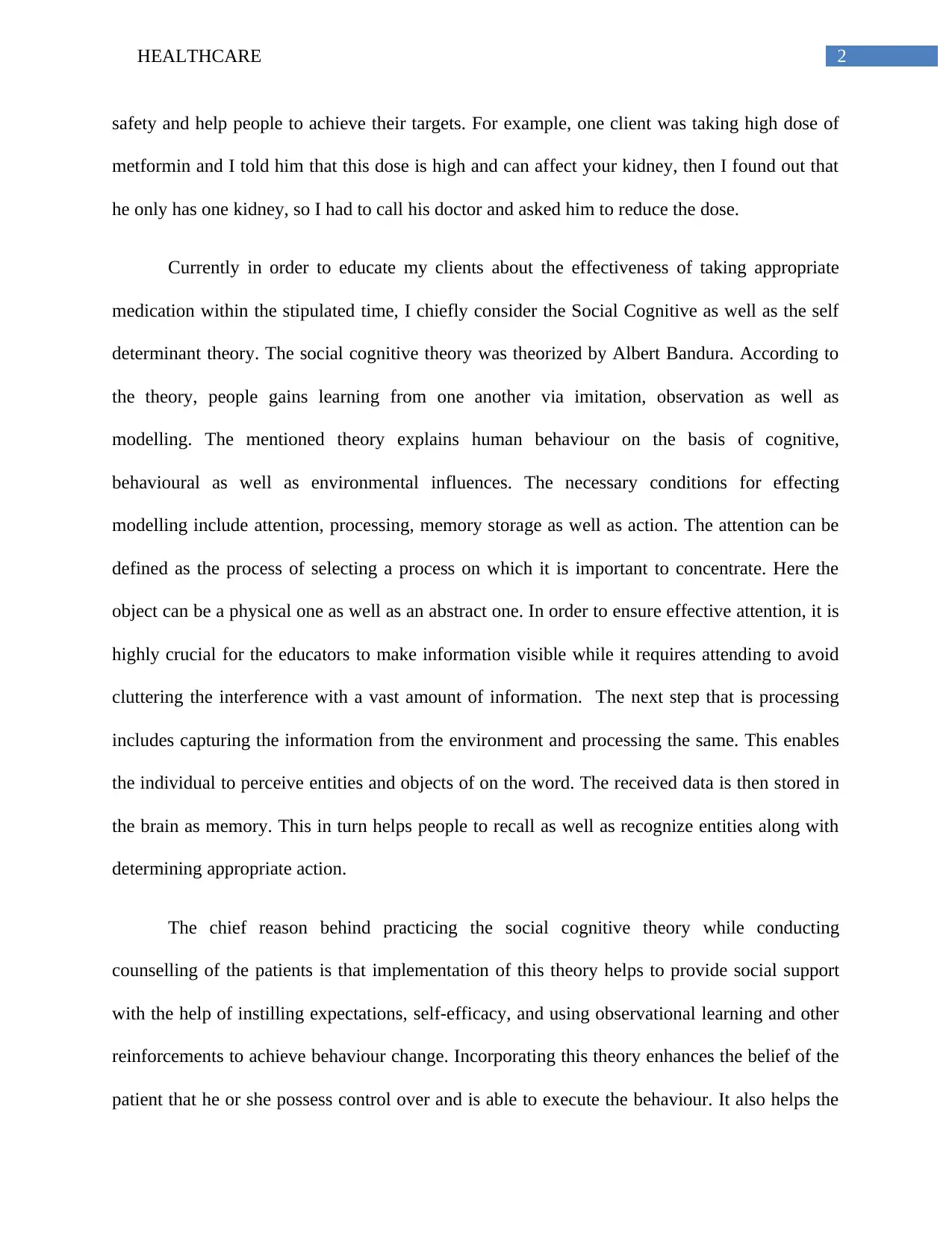
2HEALTHCARE
safety and help people to achieve their targets. For example, one client was taking high dose of
metformin and I told him that this dose is high and can affect your kidney, then I found out that
he only has one kidney, so I had to call his doctor and asked him to reduce the dose.
Currently in order to educate my clients about the effectiveness of taking appropriate
medication within the stipulated time, I chiefly consider the Social Cognitive as well as the self
determinant theory. The social cognitive theory was theorized by Albert Bandura. According to
the theory, people gains learning from one another via imitation, observation as well as
modelling. The mentioned theory explains human behaviour on the basis of cognitive,
behavioural as well as environmental influences. The necessary conditions for effecting
modelling include attention, processing, memory storage as well as action. The attention can be
defined as the process of selecting a process on which it is important to concentrate. Here the
object can be a physical one as well as an abstract one. In order to ensure effective attention, it is
highly crucial for the educators to make information visible while it requires attending to avoid
cluttering the interference with a vast amount of information. The next step that is processing
includes capturing the information from the environment and processing the same. This enables
the individual to perceive entities and objects of on the word. The received data is then stored in
the brain as memory. This in turn helps people to recall as well as recognize entities along with
determining appropriate action.
The chief reason behind practicing the social cognitive theory while conducting
counselling of the patients is that implementation of this theory helps to provide social support
with the help of instilling expectations, self-efficacy, and using observational learning and other
reinforcements to achieve behaviour change. Incorporating this theory enhances the belief of the
patient that he or she possess control over and is able to execute the behaviour. It also helps the
safety and help people to achieve their targets. For example, one client was taking high dose of
metformin and I told him that this dose is high and can affect your kidney, then I found out that
he only has one kidney, so I had to call his doctor and asked him to reduce the dose.
Currently in order to educate my clients about the effectiveness of taking appropriate
medication within the stipulated time, I chiefly consider the Social Cognitive as well as the self
determinant theory. The social cognitive theory was theorized by Albert Bandura. According to
the theory, people gains learning from one another via imitation, observation as well as
modelling. The mentioned theory explains human behaviour on the basis of cognitive,
behavioural as well as environmental influences. The necessary conditions for effecting
modelling include attention, processing, memory storage as well as action. The attention can be
defined as the process of selecting a process on which it is important to concentrate. Here the
object can be a physical one as well as an abstract one. In order to ensure effective attention, it is
highly crucial for the educators to make information visible while it requires attending to avoid
cluttering the interference with a vast amount of information. The next step that is processing
includes capturing the information from the environment and processing the same. This enables
the individual to perceive entities and objects of on the word. The received data is then stored in
the brain as memory. This in turn helps people to recall as well as recognize entities along with
determining appropriate action.
The chief reason behind practicing the social cognitive theory while conducting
counselling of the patients is that implementation of this theory helps to provide social support
with the help of instilling expectations, self-efficacy, and using observational learning and other
reinforcements to achieve behaviour change. Incorporating this theory enhances the belief of the
patient that he or she possess control over and is able to execute the behaviour. It also helps the
⊘ This is a preview!⊘
Do you want full access?
Subscribe today to unlock all pages.

Trusted by 1+ million students worldwide
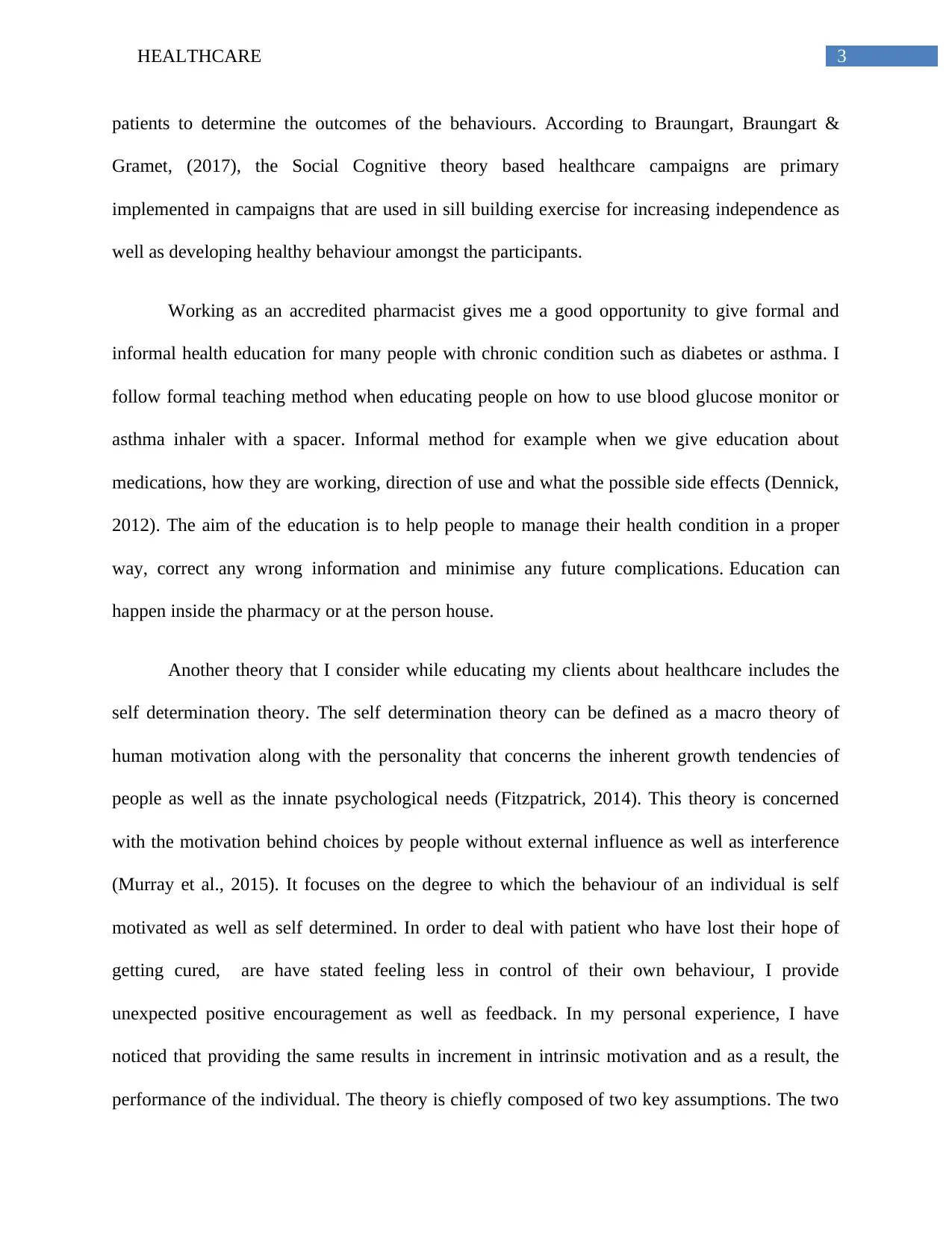
3HEALTHCARE
patients to determine the outcomes of the behaviours. According to Braungart, Braungart &
Gramet, (2017), the Social Cognitive theory based healthcare campaigns are primary
implemented in campaigns that are used in sill building exercise for increasing independence as
well as developing healthy behaviour amongst the participants.
Working as an accredited pharmacist gives me a good opportunity to give formal and
informal health education for many people with chronic condition such as diabetes or asthma. I
follow formal teaching method when educating people on how to use blood glucose monitor or
asthma inhaler with a spacer. Informal method for example when we give education about
medications, how they are working, direction of use and what the possible side effects (Dennick,
2012). The aim of the education is to help people to manage their health condition in a proper
way, correct any wrong information and minimise any future complications. Education can
happen inside the pharmacy or at the person house.
Another theory that I consider while educating my clients about healthcare includes the
self determination theory. The self determination theory can be defined as a macro theory of
human motivation along with the personality that concerns the inherent growth tendencies of
people as well as the innate psychological needs (Fitzpatrick, 2014). This theory is concerned
with the motivation behind choices by people without external influence as well as interference
(Murray et al., 2015). It focuses on the degree to which the behaviour of an individual is self
motivated as well as self determined. In order to deal with patient who have lost their hope of
getting cured, are have stated feeling less in control of their own behaviour, I provide
unexpected positive encouragement as well as feedback. In my personal experience, I have
noticed that providing the same results in increment in intrinsic motivation and as a result, the
performance of the individual. The theory is chiefly composed of two key assumptions. The two
patients to determine the outcomes of the behaviours. According to Braungart, Braungart &
Gramet, (2017), the Social Cognitive theory based healthcare campaigns are primary
implemented in campaigns that are used in sill building exercise for increasing independence as
well as developing healthy behaviour amongst the participants.
Working as an accredited pharmacist gives me a good opportunity to give formal and
informal health education for many people with chronic condition such as diabetes or asthma. I
follow formal teaching method when educating people on how to use blood glucose monitor or
asthma inhaler with a spacer. Informal method for example when we give education about
medications, how they are working, direction of use and what the possible side effects (Dennick,
2012). The aim of the education is to help people to manage their health condition in a proper
way, correct any wrong information and minimise any future complications. Education can
happen inside the pharmacy or at the person house.
Another theory that I consider while educating my clients about healthcare includes the
self determination theory. The self determination theory can be defined as a macro theory of
human motivation along with the personality that concerns the inherent growth tendencies of
people as well as the innate psychological needs (Fitzpatrick, 2014). This theory is concerned
with the motivation behind choices by people without external influence as well as interference
(Murray et al., 2015). It focuses on the degree to which the behaviour of an individual is self
motivated as well as self determined. In order to deal with patient who have lost their hope of
getting cured, are have stated feeling less in control of their own behaviour, I provide
unexpected positive encouragement as well as feedback. In my personal experience, I have
noticed that providing the same results in increment in intrinsic motivation and as a result, the
performance of the individual. The theory is chiefly composed of two key assumptions. The two
Paraphrase This Document
Need a fresh take? Get an instant paraphrase of this document with our AI Paraphraser
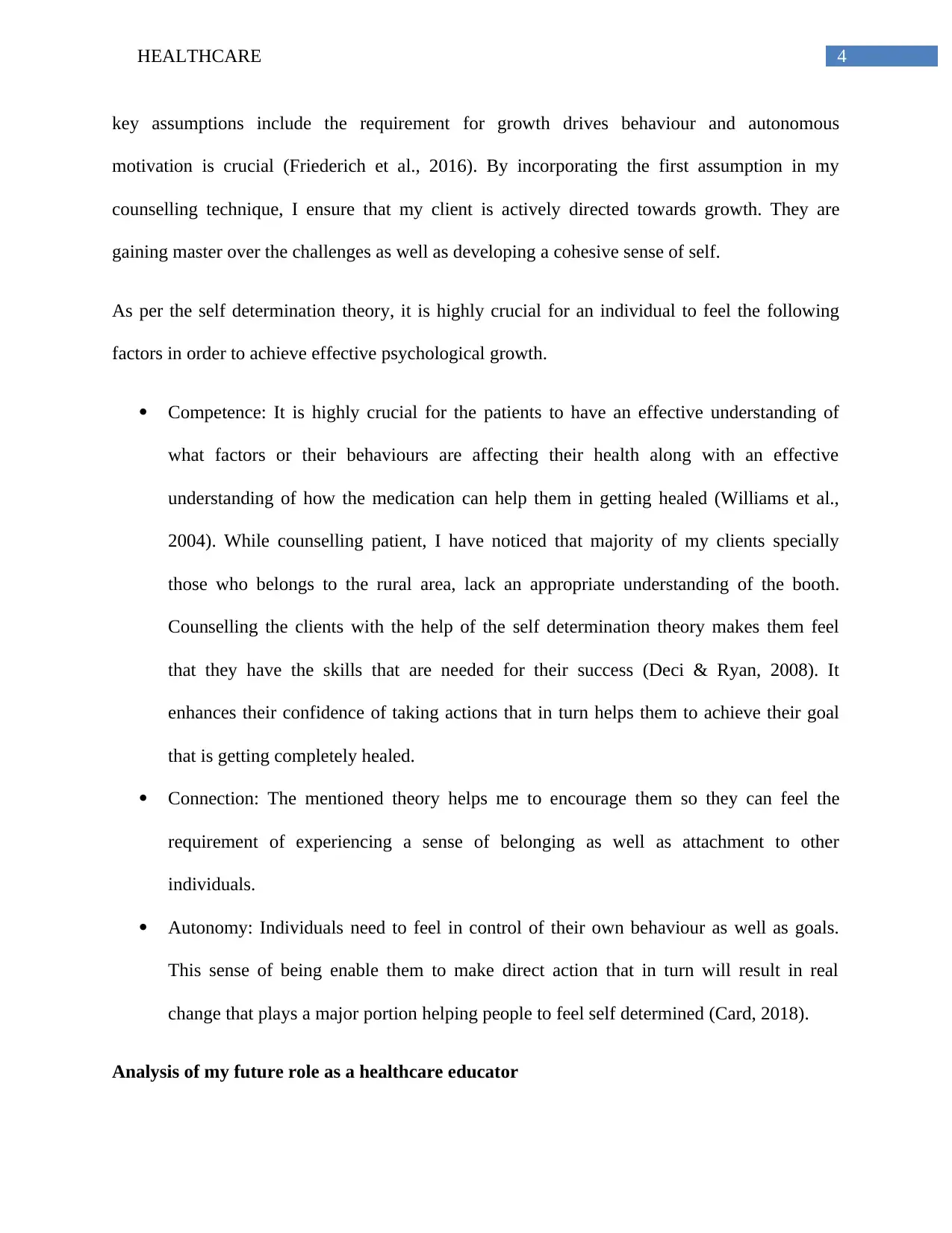
4HEALTHCARE
key assumptions include the requirement for growth drives behaviour and autonomous
motivation is crucial (Friederich et al., 2016). By incorporating the first assumption in my
counselling technique, I ensure that my client is actively directed towards growth. They are
gaining master over the challenges as well as developing a cohesive sense of self.
As per the self determination theory, it is highly crucial for an individual to feel the following
factors in order to achieve effective psychological growth.
Competence: It is highly crucial for the patients to have an effective understanding of
what factors or their behaviours are affecting their health along with an effective
understanding of how the medication can help them in getting healed (Williams et al.,
2004). While counselling patient, I have noticed that majority of my clients specially
those who belongs to the rural area, lack an appropriate understanding of the booth.
Counselling the clients with the help of the self determination theory makes them feel
that they have the skills that are needed for their success (Deci & Ryan, 2008). It
enhances their confidence of taking actions that in turn helps them to achieve their goal
that is getting completely healed.
Connection: The mentioned theory helps me to encourage them so they can feel the
requirement of experiencing a sense of belonging as well as attachment to other
individuals.
Autonomy: Individuals need to feel in control of their own behaviour as well as goals.
This sense of being enable them to make direct action that in turn will result in real
change that plays a major portion helping people to feel self determined (Card, 2018).
Analysis of my future role as a healthcare educator
key assumptions include the requirement for growth drives behaviour and autonomous
motivation is crucial (Friederich et al., 2016). By incorporating the first assumption in my
counselling technique, I ensure that my client is actively directed towards growth. They are
gaining master over the challenges as well as developing a cohesive sense of self.
As per the self determination theory, it is highly crucial for an individual to feel the following
factors in order to achieve effective psychological growth.
Competence: It is highly crucial for the patients to have an effective understanding of
what factors or their behaviours are affecting their health along with an effective
understanding of how the medication can help them in getting healed (Williams et al.,
2004). While counselling patient, I have noticed that majority of my clients specially
those who belongs to the rural area, lack an appropriate understanding of the booth.
Counselling the clients with the help of the self determination theory makes them feel
that they have the skills that are needed for their success (Deci & Ryan, 2008). It
enhances their confidence of taking actions that in turn helps them to achieve their goal
that is getting completely healed.
Connection: The mentioned theory helps me to encourage them so they can feel the
requirement of experiencing a sense of belonging as well as attachment to other
individuals.
Autonomy: Individuals need to feel in control of their own behaviour as well as goals.
This sense of being enable them to make direct action that in turn will result in real
change that plays a major portion helping people to feel self determined (Card, 2018).
Analysis of my future role as a healthcare educator
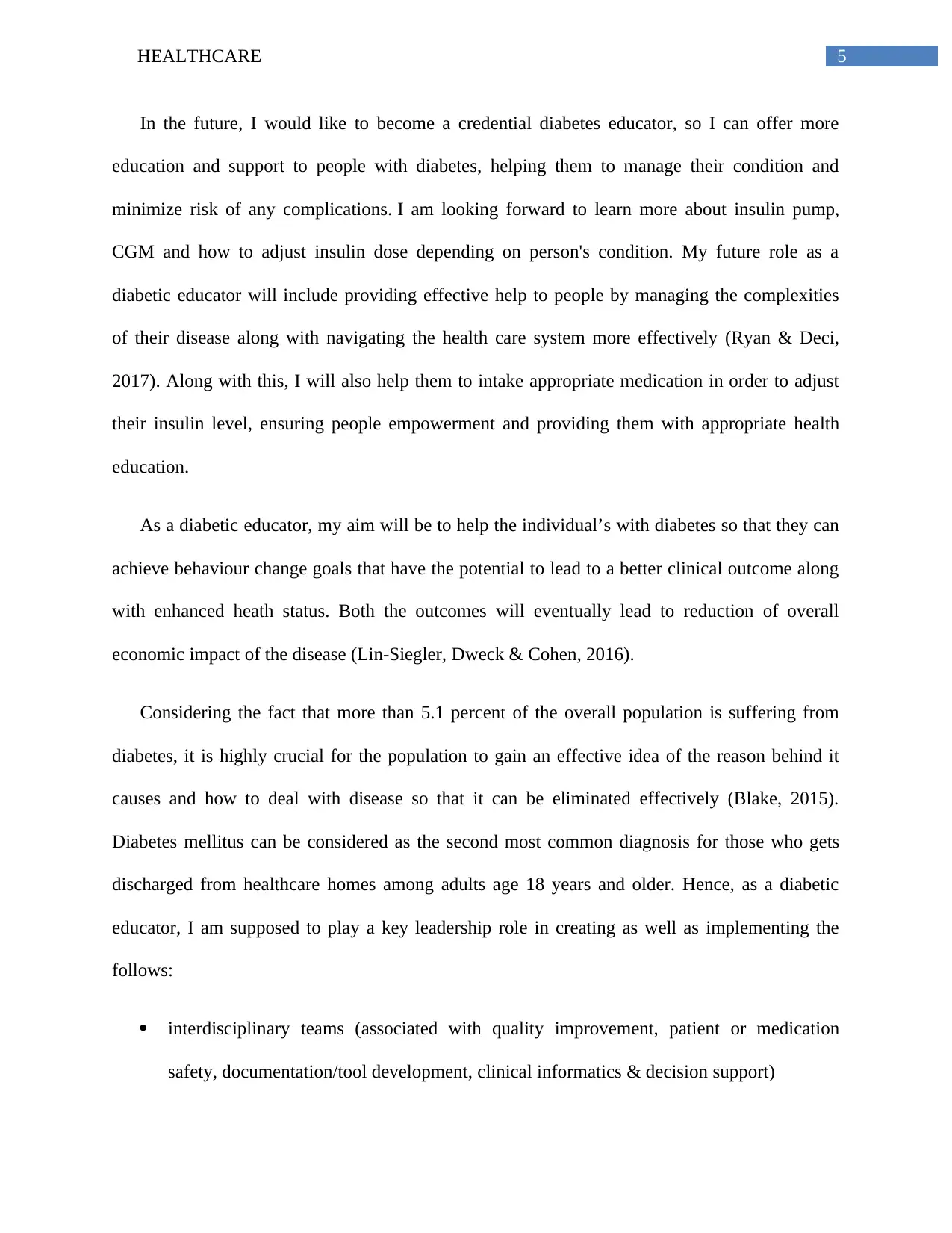
5HEALTHCARE
In the future, I would like to become a credential diabetes educator, so I can offer more
education and support to people with diabetes, helping them to manage their condition and
minimize risk of any complications. I am looking forward to learn more about insulin pump,
CGM and how to adjust insulin dose depending on person's condition. My future role as a
diabetic educator will include providing effective help to people by managing the complexities
of their disease along with navigating the health care system more effectively (Ryan & Deci,
2017). Along with this, I will also help them to intake appropriate medication in order to adjust
their insulin level, ensuring people empowerment and providing them with appropriate health
education.
As a diabetic educator, my aim will be to help the individual’s with diabetes so that they can
achieve behaviour change goals that have the potential to lead to a better clinical outcome along
with enhanced heath status. Both the outcomes will eventually lead to reduction of overall
economic impact of the disease (Lin-Siegler, Dweck & Cohen, 2016).
Considering the fact that more than 5.1 percent of the overall population is suffering from
diabetes, it is highly crucial for the population to gain an effective idea of the reason behind it
causes and how to deal with disease so that it can be eliminated effectively (Blake, 2015).
Diabetes mellitus can be considered as the second most common diagnosis for those who gets
discharged from healthcare homes among adults age 18 years and older. Hence, as a diabetic
educator, I am supposed to play a key leadership role in creating as well as implementing the
follows:
interdisciplinary teams (associated with quality improvement, patient or medication
safety, documentation/tool development, clinical informatics & decision support)
In the future, I would like to become a credential diabetes educator, so I can offer more
education and support to people with diabetes, helping them to manage their condition and
minimize risk of any complications. I am looking forward to learn more about insulin pump,
CGM and how to adjust insulin dose depending on person's condition. My future role as a
diabetic educator will include providing effective help to people by managing the complexities
of their disease along with navigating the health care system more effectively (Ryan & Deci,
2017). Along with this, I will also help them to intake appropriate medication in order to adjust
their insulin level, ensuring people empowerment and providing them with appropriate health
education.
As a diabetic educator, my aim will be to help the individual’s with diabetes so that they can
achieve behaviour change goals that have the potential to lead to a better clinical outcome along
with enhanced heath status. Both the outcomes will eventually lead to reduction of overall
economic impact of the disease (Lin-Siegler, Dweck & Cohen, 2016).
Considering the fact that more than 5.1 percent of the overall population is suffering from
diabetes, it is highly crucial for the population to gain an effective idea of the reason behind it
causes and how to deal with disease so that it can be eliminated effectively (Blake, 2015).
Diabetes mellitus can be considered as the second most common diagnosis for those who gets
discharged from healthcare homes among adults age 18 years and older. Hence, as a diabetic
educator, I am supposed to play a key leadership role in creating as well as implementing the
follows:
interdisciplinary teams (associated with quality improvement, patient or medication
safety, documentation/tool development, clinical informatics & decision support)
⊘ This is a preview!⊘
Do you want full access?
Subscribe today to unlock all pages.

Trusted by 1+ million students worldwide
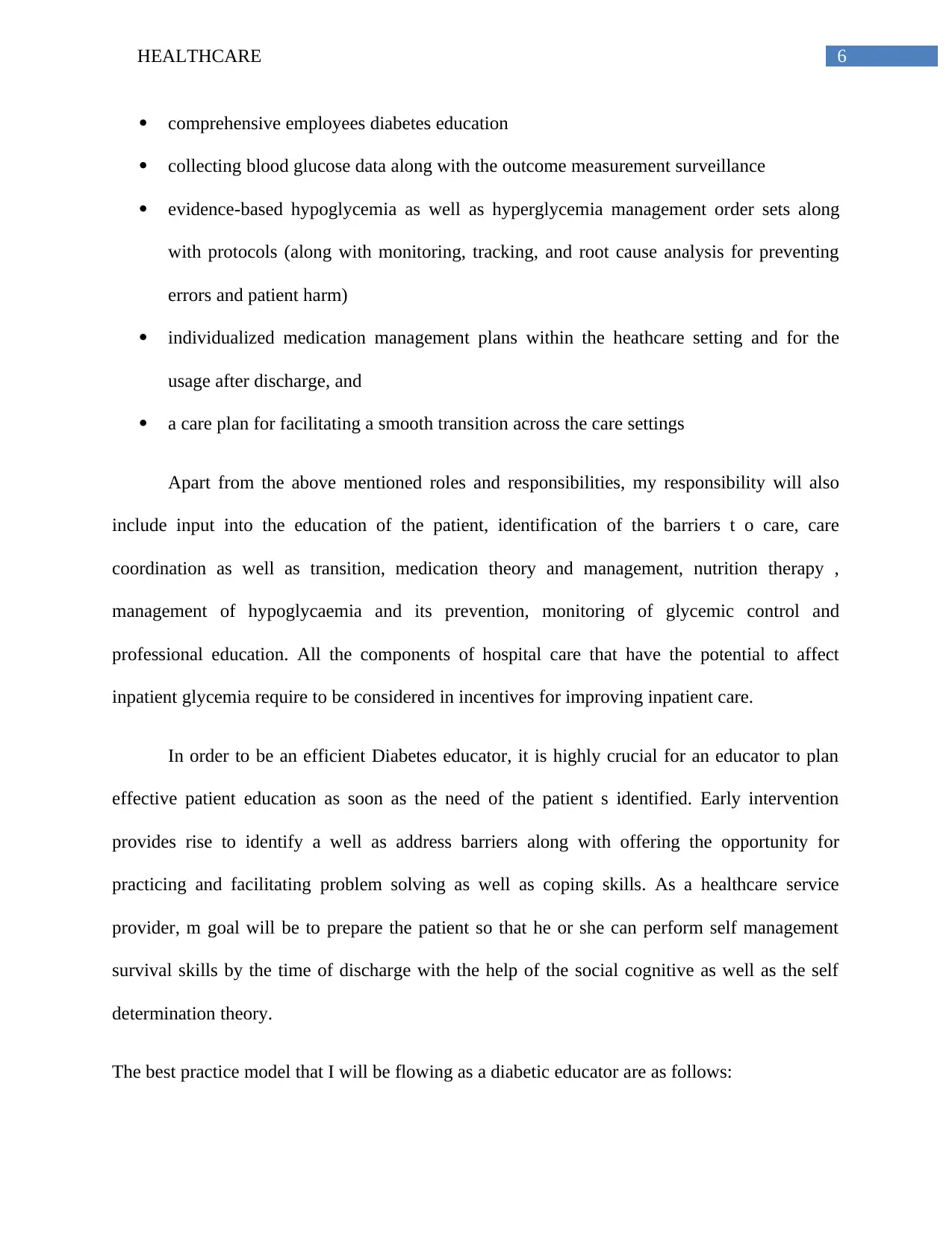
6HEALTHCARE
comprehensive employees diabetes education
collecting blood glucose data along with the outcome measurement surveillance
evidence-based hypoglycemia as well as hyperglycemia management order sets along
with protocols (along with monitoring, tracking, and root cause analysis for preventing
errors and patient harm)
individualized medication management plans within the heathcare setting and for the
usage after discharge, and
a care plan for facilitating a smooth transition across the care settings
Apart from the above mentioned roles and responsibilities, my responsibility will also
include input into the education of the patient, identification of the barriers t o care, care
coordination as well as transition, medication theory and management, nutrition therapy ,
management of hypoglycaemia and its prevention, monitoring of glycemic control and
professional education. All the components of hospital care that have the potential to affect
inpatient glycemia require to be considered in incentives for improving inpatient care.
In order to be an efficient Diabetes educator, it is highly crucial for an educator to plan
effective patient education as soon as the need of the patient s identified. Early intervention
provides rise to identify a well as address barriers along with offering the opportunity for
practicing and facilitating problem solving as well as coping skills. As a healthcare service
provider, m goal will be to prepare the patient so that he or she can perform self management
survival skills by the time of discharge with the help of the social cognitive as well as the self
determination theory.
The best practice model that I will be flowing as a diabetic educator are as follows:
comprehensive employees diabetes education
collecting blood glucose data along with the outcome measurement surveillance
evidence-based hypoglycemia as well as hyperglycemia management order sets along
with protocols (along with monitoring, tracking, and root cause analysis for preventing
errors and patient harm)
individualized medication management plans within the heathcare setting and for the
usage after discharge, and
a care plan for facilitating a smooth transition across the care settings
Apart from the above mentioned roles and responsibilities, my responsibility will also
include input into the education of the patient, identification of the barriers t o care, care
coordination as well as transition, medication theory and management, nutrition therapy ,
management of hypoglycaemia and its prevention, monitoring of glycemic control and
professional education. All the components of hospital care that have the potential to affect
inpatient glycemia require to be considered in incentives for improving inpatient care.
In order to be an efficient Diabetes educator, it is highly crucial for an educator to plan
effective patient education as soon as the need of the patient s identified. Early intervention
provides rise to identify a well as address barriers along with offering the opportunity for
practicing and facilitating problem solving as well as coping skills. As a healthcare service
provider, m goal will be to prepare the patient so that he or she can perform self management
survival skills by the time of discharge with the help of the social cognitive as well as the self
determination theory.
The best practice model that I will be flowing as a diabetic educator are as follows:
Paraphrase This Document
Need a fresh take? Get an instant paraphrase of this document with our AI Paraphraser
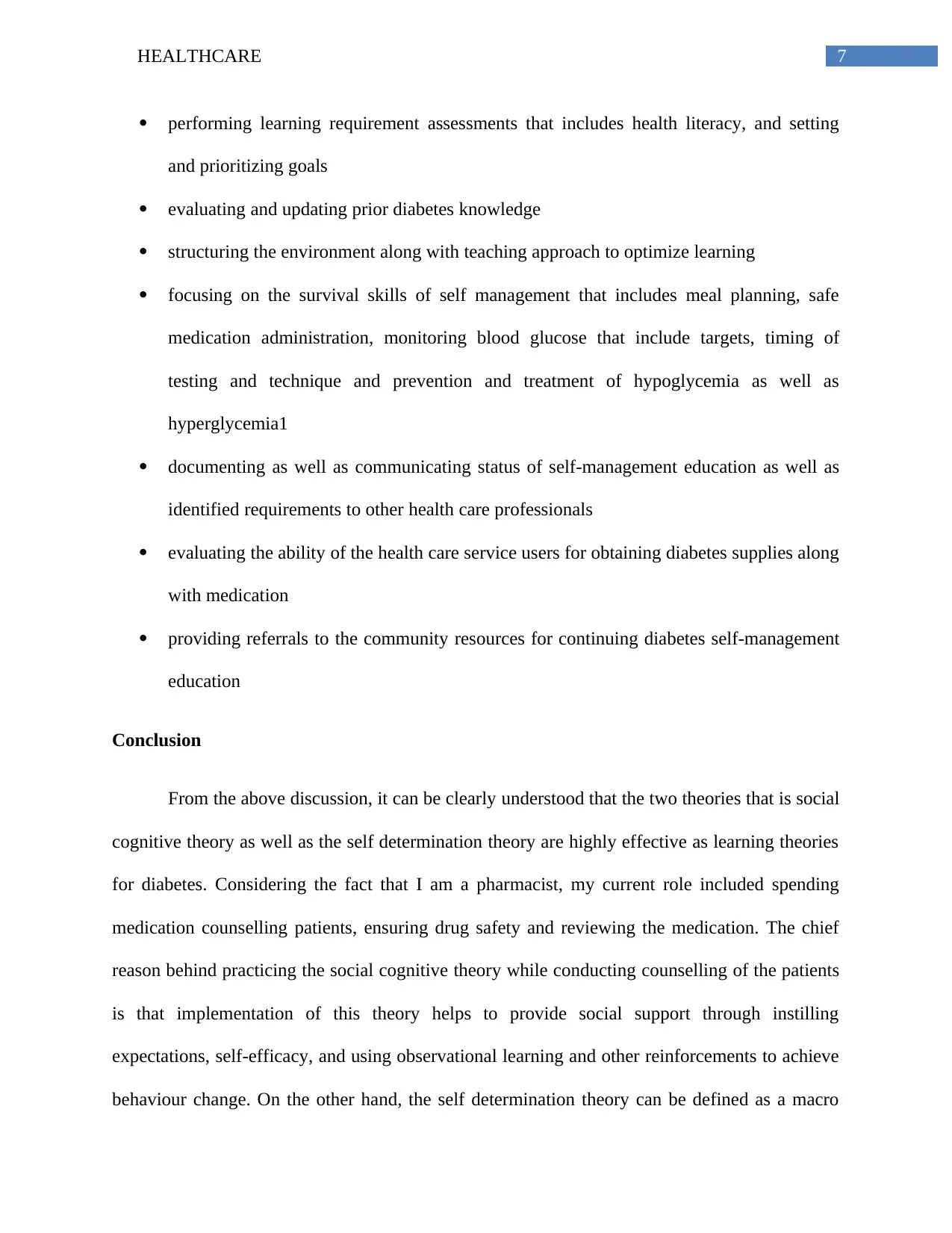
7HEALTHCARE
performing learning requirement assessments that includes health literacy, and setting
and prioritizing goals
evaluating and updating prior diabetes knowledge
structuring the environment along with teaching approach to optimize learning
focusing on the survival skills of self management that includes meal planning, safe
medication administration, monitoring blood glucose that include targets, timing of
testing and technique and prevention and treatment of hypoglycemia as well as
hyperglycemia1
documenting as well as communicating status of self-management education as well as
identified requirements to other health care professionals
evaluating the ability of the health care service users for obtaining diabetes supplies along
with medication
providing referrals to the community resources for continuing diabetes self-management
education
Conclusion
From the above discussion, it can be clearly understood that the two theories that is social
cognitive theory as well as the self determination theory are highly effective as learning theories
for diabetes. Considering the fact that I am a pharmacist, my current role included spending
medication counselling patients, ensuring drug safety and reviewing the medication. The chief
reason behind practicing the social cognitive theory while conducting counselling of the patients
is that implementation of this theory helps to provide social support through instilling
expectations, self-efficacy, and using observational learning and other reinforcements to achieve
behaviour change. On the other hand, the self determination theory can be defined as a macro
performing learning requirement assessments that includes health literacy, and setting
and prioritizing goals
evaluating and updating prior diabetes knowledge
structuring the environment along with teaching approach to optimize learning
focusing on the survival skills of self management that includes meal planning, safe
medication administration, monitoring blood glucose that include targets, timing of
testing and technique and prevention and treatment of hypoglycemia as well as
hyperglycemia1
documenting as well as communicating status of self-management education as well as
identified requirements to other health care professionals
evaluating the ability of the health care service users for obtaining diabetes supplies along
with medication
providing referrals to the community resources for continuing diabetes self-management
education
Conclusion
From the above discussion, it can be clearly understood that the two theories that is social
cognitive theory as well as the self determination theory are highly effective as learning theories
for diabetes. Considering the fact that I am a pharmacist, my current role included spending
medication counselling patients, ensuring drug safety and reviewing the medication. The chief
reason behind practicing the social cognitive theory while conducting counselling of the patients
is that implementation of this theory helps to provide social support through instilling
expectations, self-efficacy, and using observational learning and other reinforcements to achieve
behaviour change. On the other hand, the self determination theory can be defined as a macro
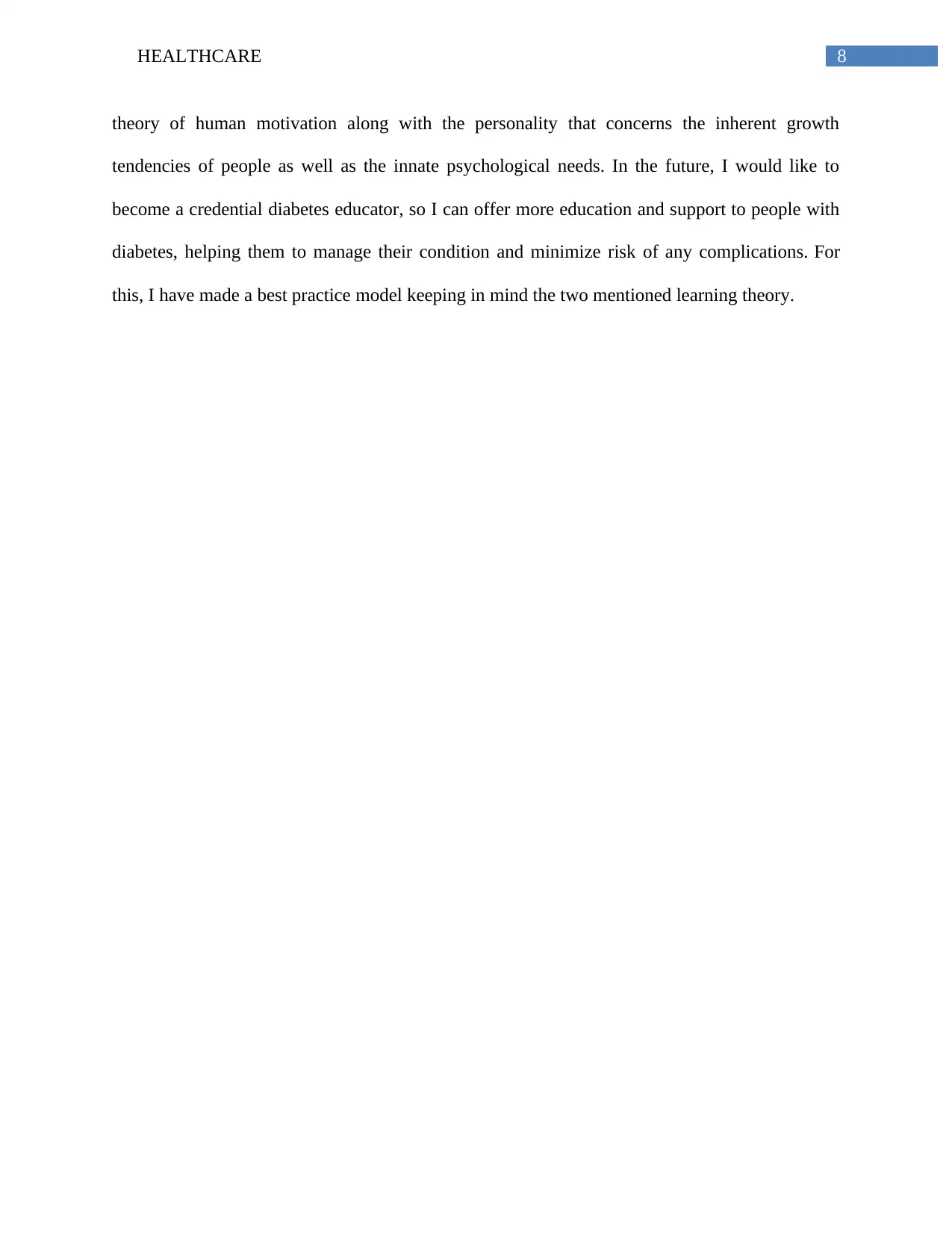
8HEALTHCARE
theory of human motivation along with the personality that concerns the inherent growth
tendencies of people as well as the innate psychological needs. In the future, I would like to
become a credential diabetes educator, so I can offer more education and support to people with
diabetes, helping them to manage their condition and minimize risk of any complications. For
this, I have made a best practice model keeping in mind the two mentioned learning theory.
theory of human motivation along with the personality that concerns the inherent growth
tendencies of people as well as the innate psychological needs. In the future, I would like to
become a credential diabetes educator, so I can offer more education and support to people with
diabetes, helping them to manage their condition and minimize risk of any complications. For
this, I have made a best practice model keeping in mind the two mentioned learning theory.
⊘ This is a preview!⊘
Do you want full access?
Subscribe today to unlock all pages.

Trusted by 1+ million students worldwide
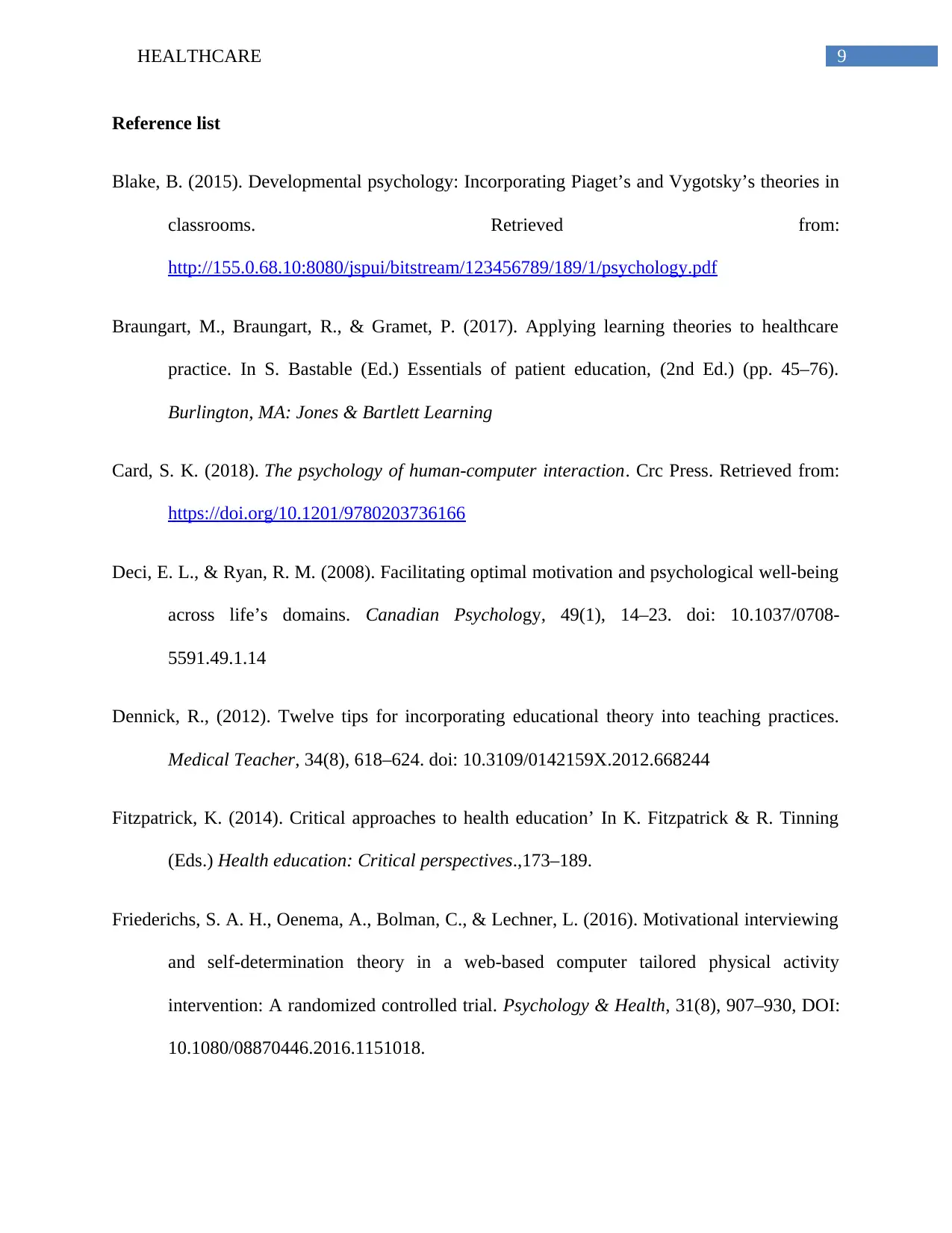
9HEALTHCARE
Reference list
Blake, B. (2015). Developmental psychology: Incorporating Piaget’s and Vygotsky’s theories in
classrooms. Retrieved from:
http://155.0.68.10:8080/jspui/bitstream/123456789/189/1/psychology.pdf
Braungart, M., Braungart, R., & Gramet, P. (2017). Applying learning theories to healthcare
practice. In S. Bastable (Ed.) Essentials of patient education, (2nd Ed.) (pp. 45–76).
Burlington, MA: Jones & Bartlett Learning
Card, S. K. (2018). The psychology of human-computer interaction. Crc Press. Retrieved from:
https://doi.org/10.1201/9780203736166
Deci, E. L., & Ryan, R. M. (2008). Facilitating optimal motivation and psychological well-being
across life’s domains. Canadian Psychology, 49(1), 14–23. doi: 10.1037/0708-
5591.49.1.14
Dennick, R., (2012). Twelve tips for incorporating educational theory into teaching practices.
Medical Teacher, 34(8), 618–624. doi: 10.3109/0142159X.2012.668244
Fitzpatrick, K. (2014). Critical approaches to health education’ In K. Fitzpatrick & R. Tinning
(Eds.) Health education: Critical perspectives.,173–189.
Friederichs, S. A. H., Oenema, A., Bolman, C., & Lechner, L. (2016). Motivational interviewing
and self-determination theory in a web-based computer tailored physical activity
intervention: A randomized controlled trial. Psychology & Health, 31(8), 907–930, DOI:
10.1080/08870446.2016.1151018.
Reference list
Blake, B. (2015). Developmental psychology: Incorporating Piaget’s and Vygotsky’s theories in
classrooms. Retrieved from:
http://155.0.68.10:8080/jspui/bitstream/123456789/189/1/psychology.pdf
Braungart, M., Braungart, R., & Gramet, P. (2017). Applying learning theories to healthcare
practice. In S. Bastable (Ed.) Essentials of patient education, (2nd Ed.) (pp. 45–76).
Burlington, MA: Jones & Bartlett Learning
Card, S. K. (2018). The psychology of human-computer interaction. Crc Press. Retrieved from:
https://doi.org/10.1201/9780203736166
Deci, E. L., & Ryan, R. M. (2008). Facilitating optimal motivation and psychological well-being
across life’s domains. Canadian Psychology, 49(1), 14–23. doi: 10.1037/0708-
5591.49.1.14
Dennick, R., (2012). Twelve tips for incorporating educational theory into teaching practices.
Medical Teacher, 34(8), 618–624. doi: 10.3109/0142159X.2012.668244
Fitzpatrick, K. (2014). Critical approaches to health education’ In K. Fitzpatrick & R. Tinning
(Eds.) Health education: Critical perspectives.,173–189.
Friederichs, S. A. H., Oenema, A., Bolman, C., & Lechner, L. (2016). Motivational interviewing
and self-determination theory in a web-based computer tailored physical activity
intervention: A randomized controlled trial. Psychology & Health, 31(8), 907–930, DOI:
10.1080/08870446.2016.1151018.
Paraphrase This Document
Need a fresh take? Get an instant paraphrase of this document with our AI Paraphraser
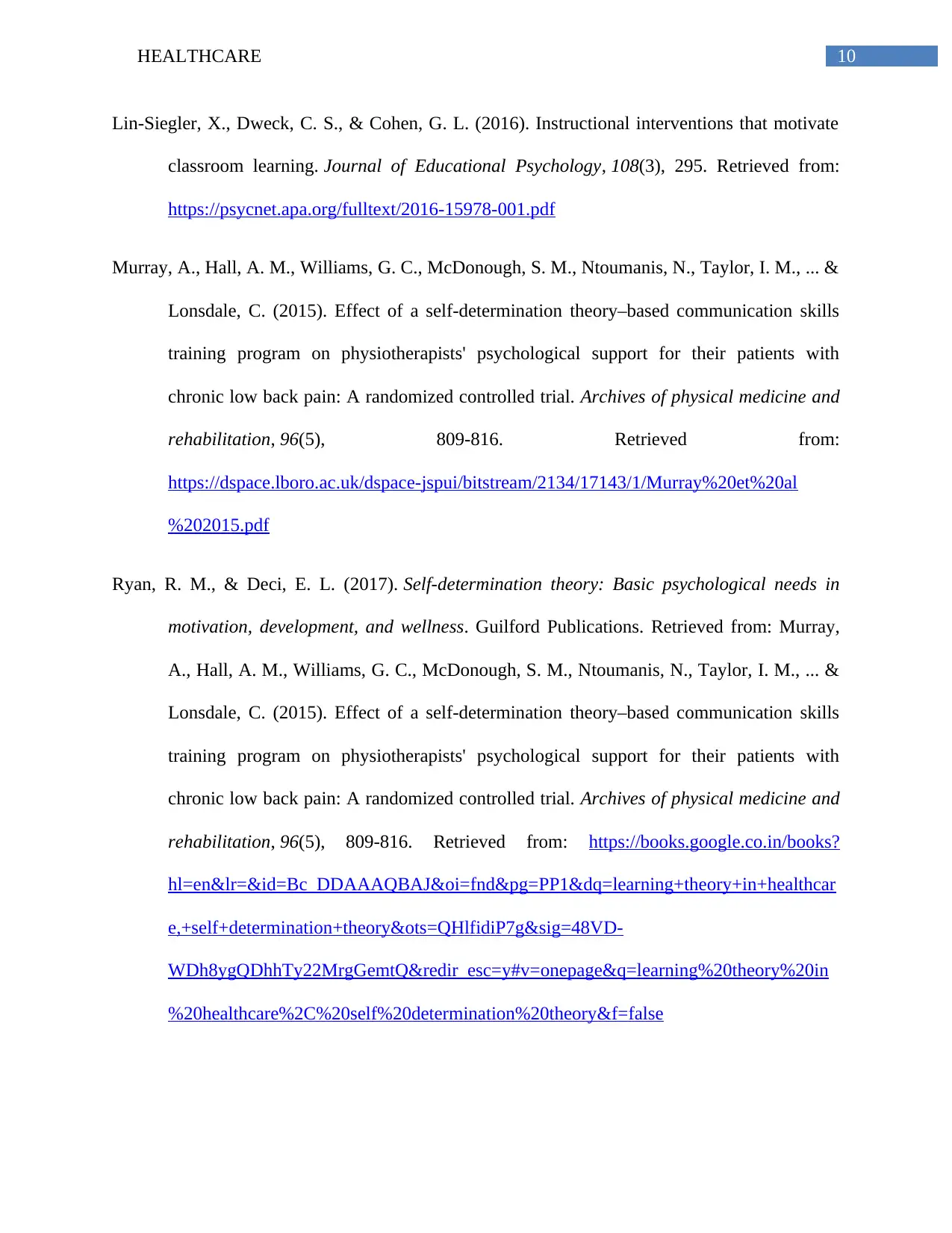
10HEALTHCARE
Lin-Siegler, X., Dweck, C. S., & Cohen, G. L. (2016). Instructional interventions that motivate
classroom learning. Journal of Educational Psychology, 108(3), 295. Retrieved from:
https://psycnet.apa.org/fulltext/2016-15978-001.pdf
Murray, A., Hall, A. M., Williams, G. C., McDonough, S. M., Ntoumanis, N., Taylor, I. M., ... &
Lonsdale, C. (2015). Effect of a self-determination theory–based communication skills
training program on physiotherapists' psychological support for their patients with
chronic low back pain: A randomized controlled trial. Archives of physical medicine and
rehabilitation, 96(5), 809-816. Retrieved from:
https://dspace.lboro.ac.uk/dspace-jspui/bitstream/2134/17143/1/Murray%20et%20al
%202015.pdf
Ryan, R. M., & Deci, E. L. (2017). Self-determination theory: Basic psychological needs in
motivation, development, and wellness. Guilford Publications. Retrieved from: Murray,
A., Hall, A. M., Williams, G. C., McDonough, S. M., Ntoumanis, N., Taylor, I. M., ... &
Lonsdale, C. (2015). Effect of a self-determination theory–based communication skills
training program on physiotherapists' psychological support for their patients with
chronic low back pain: A randomized controlled trial. Archives of physical medicine and
rehabilitation, 96(5), 809-816. Retrieved from: https://books.google.co.in/books?
hl=en&lr=&id=Bc_DDAAAQBAJ&oi=fnd&pg=PP1&dq=learning+theory+in+healthcar
e,+self+determination+theory&ots=QHlfidiP7g&sig=48VD-
WDh8ygQDhhTy22MrgGemtQ&redir_esc=y#v=onepage&q=learning%20theory%20in
%20healthcare%2C%20self%20determination%20theory&f=false
Lin-Siegler, X., Dweck, C. S., & Cohen, G. L. (2016). Instructional interventions that motivate
classroom learning. Journal of Educational Psychology, 108(3), 295. Retrieved from:
https://psycnet.apa.org/fulltext/2016-15978-001.pdf
Murray, A., Hall, A. M., Williams, G. C., McDonough, S. M., Ntoumanis, N., Taylor, I. M., ... &
Lonsdale, C. (2015). Effect of a self-determination theory–based communication skills
training program on physiotherapists' psychological support for their patients with
chronic low back pain: A randomized controlled trial. Archives of physical medicine and
rehabilitation, 96(5), 809-816. Retrieved from:
https://dspace.lboro.ac.uk/dspace-jspui/bitstream/2134/17143/1/Murray%20et%20al
%202015.pdf
Ryan, R. M., & Deci, E. L. (2017). Self-determination theory: Basic psychological needs in
motivation, development, and wellness. Guilford Publications. Retrieved from: Murray,
A., Hall, A. M., Williams, G. C., McDonough, S. M., Ntoumanis, N., Taylor, I. M., ... &
Lonsdale, C. (2015). Effect of a self-determination theory–based communication skills
training program on physiotherapists' psychological support for their patients with
chronic low back pain: A randomized controlled trial. Archives of physical medicine and
rehabilitation, 96(5), 809-816. Retrieved from: https://books.google.co.in/books?
hl=en&lr=&id=Bc_DDAAAQBAJ&oi=fnd&pg=PP1&dq=learning+theory+in+healthcar
e,+self+determination+theory&ots=QHlfidiP7g&sig=48VD-
WDh8ygQDhhTy22MrgGemtQ&redir_esc=y#v=onepage&q=learning%20theory%20in
%20healthcare%2C%20self%20determination%20theory&f=false
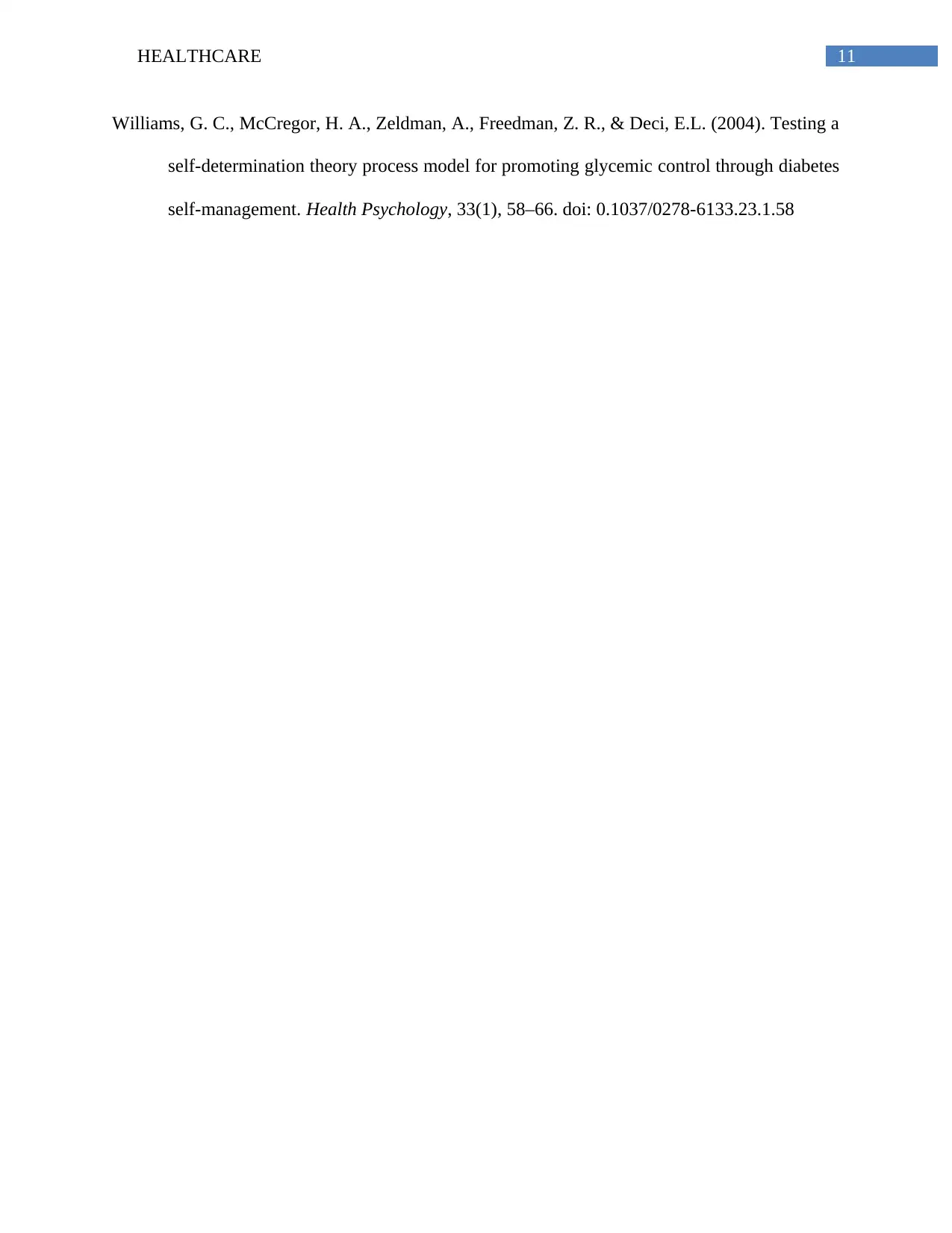
11HEALTHCARE
Williams, G. C., McCregor, H. A., Zeldman, A., Freedman, Z. R., & Deci, E.L. (2004). Testing a
self-determination theory process model for promoting glycemic control through diabetes
self-management. Health Psychology, 33(1), 58–66. doi: 0.1037/0278-6133.23.1.58
Williams, G. C., McCregor, H. A., Zeldman, A., Freedman, Z. R., & Deci, E.L. (2004). Testing a
self-determination theory process model for promoting glycemic control through diabetes
self-management. Health Psychology, 33(1), 58–66. doi: 0.1037/0278-6133.23.1.58
⊘ This is a preview!⊘
Do you want full access?
Subscribe today to unlock all pages.

Trusted by 1+ million students worldwide
1 out of 12
Related Documents
Your All-in-One AI-Powered Toolkit for Academic Success.
+13062052269
info@desklib.com
Available 24*7 on WhatsApp / Email
![[object Object]](/_next/static/media/star-bottom.7253800d.svg)
Unlock your academic potential
Copyright © 2020–2026 A2Z Services. All Rights Reserved. Developed and managed by ZUCOL.





